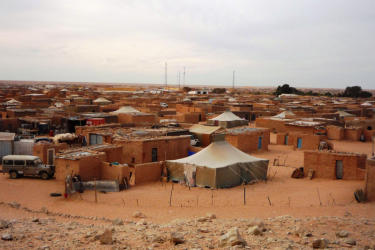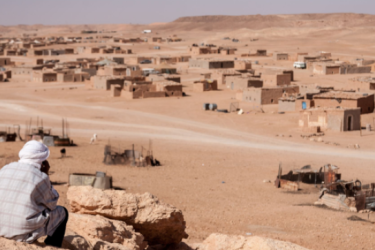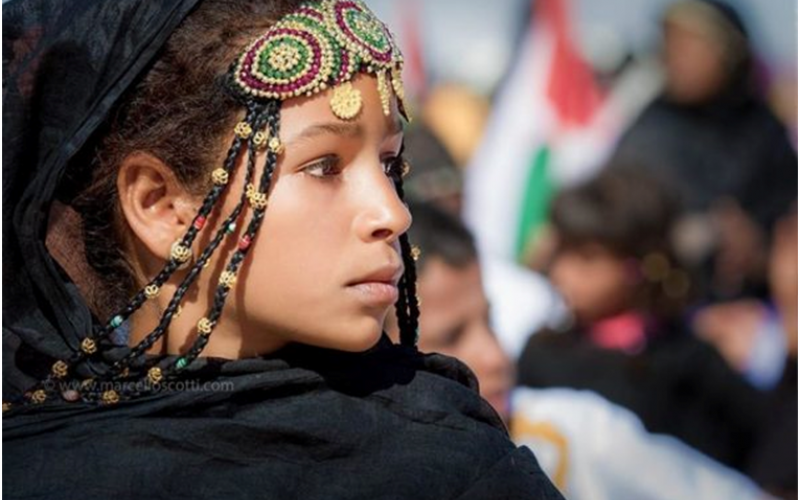Western Sahara

How the UN betrayed the decolonisation of Western Sahara

Western Sahara: Colonialism, labor and imperialist complicity

Anti-colonial labour internationalisms: The Saharawi and Palestinian liberation struggles
What the world needs to know about Western Sahara

Western Sahara: An albatross on the African Union’s conscience

By Nizar K. Visram
Western Sahara: ‘No one will give us our freedom’

[Click HERE for more on the struggle of the people of Western Sahara.]
By Ryan Mallett-Outtrim and Laura Gilbie
March 11, 2012 -- Green Left Weekly/Links International Journal of Socialist Renewal -- After two decades of political deadlock, Africa’s oldest refugee population is losing faith in UN mandated peace negotiations.
“No one will give us our freedom — we must take it!,” Sahrawi journalist Embarka Elmehdi Said told Green Left Weekly. Said sees little hope for a peaceful resolution to the crisis that has gripped Western Sahara since its independence from Spain in the 1970s.
A child when her family fled the Moroccan invasion of Western Sahara in 1975, Said has spent most of her life in the Polisario run refugee camps on the Western Sahar-Algeria border.
Her two sons, aged 12 and three, have spent all their lives in the camps.
Western Sahara: `We want to go back to our country. Nothing will stop us wanting our rights'
Tagiyou Aslama. Photo by Alan Bain.
Tony Iltis interviews Tagiyou Aslama
Statement by the African Movement of Solidarity with the Saharawi People
March 11, 2010 -- A meeting of the Popular African Movement of Solidarity with the Saharawi People was held on the eve of the 34th anniversary of the proclamation of SADR (Saharawi Arab Democratic Republic), in Algiers, on the 26thSouth Africa, Algeria and Nigeria. An important delegation from the SADR was present at this meeting. of February 2010. It grouped civil and political movements from
The delegates included representatives of Movements of National Liberation, parliamentarians and political figures, Trade Unionists, representatives from different associations dealing with Women, Peasants, Youth and Students, Lawyers, Sports and Culture. In keeping with their commitment and convictions, and faithfulness to their history, they resolved to support the Sahrawi people, and their sole legitimate representative, the POLISARIO Front and its state, the SADR, a founder member of the African Union.
On this joyous occasion, the gathering formed a single, common delegation to take part in the official celebration of the 34th anniversary of the proclamation of the RASD on the 27th February 2010 in Bir Lehlu (a Liberated Territory of the SADR).
Polisario Front briefing paper on the question of Western Sahara
By the Polisario Front
October 2009
1. Western Sahara (the Saharawi Arab Democratic Republic) is located in northwest Africa and covers an area of 266,000 square kilometres. It is bordered by Morocco to the north, Algeria to the northeast and Mauritania to the East and southeast and has a 1,200-kilometre-long Atlantic Ocean coastline. The Saharawi Republic was proclaimed on 27 February 1976; its capital is El Aaiún.
2. In the pre-colonial times, the Saharawis lived as one independent community and developed their own cultural forms of expression and socio-political organisations; it was these idiosyncratic elements that constituted the distinctiveness of the Saharawi society over the centuries. The Saharawi are known for being a tolerant, open and peaceful society that has never been involved in any form of political or religious extremism.
Western Sahara: Venezuela's President Chavez calls for liberation of the Sahrawi people
By the Bolivarian News Agency
September 21, 2009 -- The president of the Bolivarian Republic of Venezuela, Hugo Chavez Frias, expressed his solidarity to the people of the Sahrawi Arab Democratic Republic to reach their independence from Morocco.
The statement was issued by President Chavez during his talk with Mohamed Saui, who studies in Cuba and is now visiting Venezuela together with a delegation of young African students who are to take part on the Third Cultural Festival of the People of Africa, from September 20 to 25, on the way to the Summit of Presidents Africa-South America.
“As Fidel [Castro] told you, I tell you on behalf of Venezuela: We support and we will always support the cause of your people, the cause of the freedom of the Sahrawi people”, Chavez expressed.
Moreover, he reaffirmed his commitment of eventually visiting the Sahrawi Arab Democratic Republic and he categorically affirmed that “it is necessary that we have more awareness and solidarity with the Sahrawi people”.
The Venezuelan president expressed as well that the Bolivarian government has travelled up to the country located in the western Sahara. “Minister Ramirez was there; there are some students from here; and we have been modestly cooperating.”
Australia: Damage on many fronts in false charge of slavery in Western Sahara

A documentary on Western Sahara refugees marks a low point, Kamal Fa
